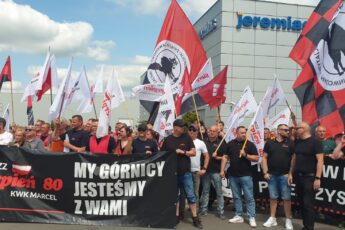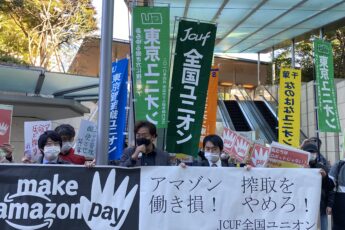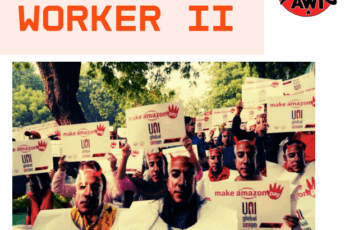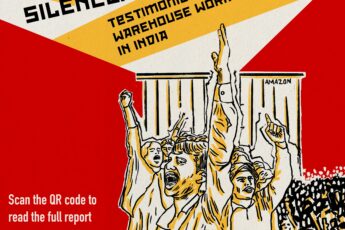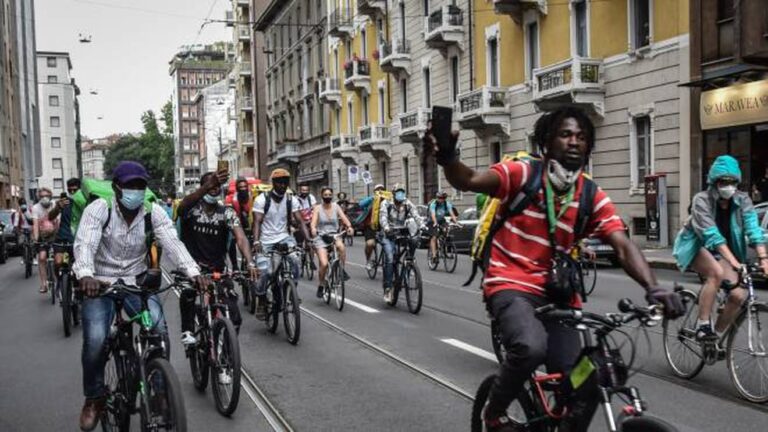
An Interview with Angelo Avelli (Deliverance, Milan) by PRECARIOUS DISCONNECTIONS
In this interview with Angelo Avelli of Deliverance Milan, we tried to touch on all of the most relevant issues of the riders’ struggles and organising within and beyond the pandemic: the political significance of the dispute over the legal classification of their work; the meaning of their claim about subordinate employment; the recently “discovered” essential character of riders’ work; the high percentage of a migrant workforce employed in delivery and the consequent problems in renewing residence permits for those under the Bossi-Fini law, and the despotism of commissions for asylum seekers. It also seemed important to us that we ask questions about the kind of unionism that riders are practicing and about its political originality, especially now that they are asking to be included in the logistics contract, while they continue to think about the possibility of a transnational riders’ strike.
The riders’ dispute currently has an importance that goes beyond this specific labour segment. What have riders become after these years of public presence? How has the participation of the riders in the struggles changed in the last year, bearing in mind that the pandemic has intensified their work-load and thus their exploitation?
First, there was the ruling of the Court of Palermo that recognised a rider as a subordinate employee; second, there was a ministerial notice that pointed to the fact that riders are subordinate employees; finally, Just Eat declared that it would hire workers, at least in Milan and Rome. The long-standing claim of being recognised as subordinate employees has recently gained momentum. However, what we won before was linked to the ruling of the Corte di Cassazione [the Italian Supreme Court]and the Jobs Act where, in the case of collaborations, as a self-employed ‘hetero-organised’ worker, you should see the discipline of subordinate employment applied to you.
Basically, what does it say? That you are a self-employed hetero-organised worker, but you are entitled to the protections guaranteed by subordinate employment. It is a mixed structure, a sort of CO.CO.CO. [non-fixed term contract] that entitles you to all the rights of subordinate employment. This could represent a development if the platform’s managers were not crazy criminals, i.e. we could gain access to the package of protections that represent the pillars of subordinate employment: guaranteed working hours, hourly pay according to national collective agreements, holidays, sick leave, and severance pay. Then there is the protection against termination (from the app) and allowances, which are given by the law. Now, for example, in the agreement between UGL [General Labour Union – right-wing Italian union] and AssoDelivery [association of Italian food-delivery employers] there are allowances for night work, bad weather, and holidays , but they are not applied. There can be a deluge, but they don’t give you shit. It is clear that we would like be subordinate employees, but a ‘reinforced’ CO.CO.CO. would also favour the possibility to ask for a residence permit. We are asking for that.
What are the platforms doing now? They are abusing casual contracts and the model of self-employment, which is never what they say it is. If the company you work for uses the formula of autonomous collaboration, requiring a VAT registration but doesn’t give you any possibility to make choices or negotiate anything, what kind of self-employed person are you? In addition, you may be forced to work like crazy, staying logged in on two platforms. Some workers do this, but most of them have one fixed platform and also a second one. There is no ‘entrepreneurial’ will, but the simple need to work more than one app can guarantee. Deliveroo now also allows ‘free login’, which means they’ve dismantled the system of shifts booking so that you go online and, when the service is active, you go out and hope that delivery calls arrive. But with Uber, which is the father of the free login, as well as now with Deliveroo, I see people standing in the streets for hours and hours and not earning shit. I see African guys who earn 7 or 8 euros and make two or three deliveries in a day. I think this is a form of a gangmaster system, both in terms of the control that is exercised over people and the starvation wages that are paid.
Most of the riders are migrant workers. They are often asylum seekers waiting for the Commission’s ruling. Many others live under the Bossi-Fini regime and the blackmail of the residence permit. We don’t see that this aspect has any particular weight in the riders’ claims. What is the participation of migrant riders in the struggles? Don’t you think that their specific condition should be explicitly considered in your demands?
There is an explicit demand: the one related to the contractual framework. We say that we would like contracts that facilitate the renewal of residence permits. The claim is very classic, i.e. linked to subordination, for the simple fact that subordination is the model that allows full protection and full rights to workers. Obviously, if you go and talk to the single worker, he doesn’t give a shit about subordination per se. Instead, the question about which workers care most is that of protection, social protection, access to welfare and the need to get away from the blackmail of piecework, which passes through the possibility of having a guaranteed minimum wage. In our demands, we ask for an hourly wage for two reasons: first of all because, if you do not break the piecework mechanism, it is much more difficult to break the company narrative, the rhetoric of “I work my ass off and I earn a lot.” On the other hand, we realise that the logic of the guaranteed minimum wage is not much compared to the fact that the only way to diminish the effect of pressure, control, and exploitation aimed at productivity that companies demand is that of the hourly wage. During this second pandemic wave, I’m working mainly as a delivery boy. I work with Just Eat which has higher wages in proportion and on average manages to guarantee at least one and a half deliveries every hour.
Tell us more about the involvement of migrant workers within these struggles.
These guys I was talking about are mainly African asylum seekers, as well as many Pakistanis, Afghans and Bangladeshis who are mainly students of technical or scientific faculties; they’re all struggling. It’s been under construction, but the struggle it’s growing. Many of them are asylum seekers who are still living in reception centers, and we are now trying to get political communication through those structures as well. For now, there are still no specific claims that articulate the problem of residence permits differently from the union’s level. Building representation, curbing the power of platforms and contractualisation are the main axes of the struggle, which remains union-based. On the political level, they know that it is important to maintain a good relationship with the institutions with which it is useful to have a proactive dialogue. A second aspect of the political level was migrants’ regularisation: although the mobilisation on migrants’ regularisation was not exactly a bombshell and was in fact a blunt instrument from the beginning, the workers still wanted to be informed and present in the demands against the regularisation’s requirements. At the moment, the trade union plan is dominant, but we hope that once that level of struggle will be settled that other discussions can be held.
In June, the mobilisation on the issue of trains [against the bike ban on trains in Milan] has seen more than three hundred workers move during the full pandemic. Along with that, the day after the application of the contract of AssoDelivery, they lowered the wages as an immediate reaction by pissing off everyone. The level of radicalism and awareness has skyrocketed. On the 30th of October we called a strike, even though we knew that a week strike for those who earn so little has a very heavy impact, and there has been a good response with a contagion effect of the strike.
On the 30th of October we called a strike, even though we knew that a week strike for those who earn so little has a very heavy impact, and there has been a good response with a contagion effect of the strike.
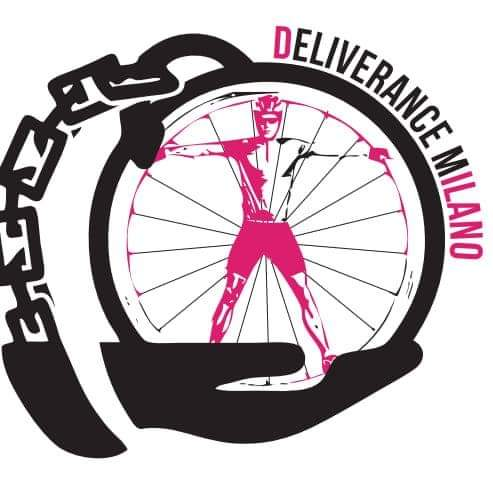
How has the pandemic affected riders’ struggles? Indeed, in recent months, with the further explosion of delivery, the work of the riders has taken on a different centrality, and in some ways you have become essential workers. Has this transformation, the increase in work, been matched by an increase in struggle?
In reality there always needed to be a trigger, the pandemic initially acted as an accelerator, i.e. we were in the process of expanding on the metropolitan scale and getting in touch with other Italian and migrant workers. The pandemic put workers in the position of being alone on the streets working harder and without personal protective equipment. This, together with the fact that riders started to be considered essential workers, made the problem of exploitation more evident.
Initially, riders were part of the gig economy in general, but now it seems that this framework is no longer sufficient and it has become necessary to attack specific points, with wages becoming a central component.
Of course, wages and the right to bargain are central. With the platforms you have no right to negotiate, they are Nazis, you sign the contractual terms and then that’s it. Those are the instructions for use, and you can only say yes. This is the most extreme framework of precariousness that we can think of, at least on a metropolitan level. What’s happening in the gig economy is paradigmatic, but it’s not the generalised model, of course; we have tried to revive the debate on job insecurity from a political point of view. After the Jobs Act nothing happened for years and the struggle of the deliverers, in Milan as in Turin, had the effect of bringing precarity back into the public debate. We do not criticize the gig economy itself but precarity, because if you work as a rider you are without a safety net and options to fall back on. Workers are now rediscovering the importance of trade unions, which in turn must open up to dialogue with new subjects among autonomous representatives and what we have begun to call ‘metropolitan unions’.
You are demanding to be included in the logistics contract and therefore to recognise the work carried out by riders in recent months as essential work. Can you tell us about the significance of this demand beyond the pandemic horizon?
This long-standing claim is related to the national collective contract for logistics, for a political reason, which is articulated on several points. First, the kind of work you do, i.e. transport. Second, the quality of the contract. Third, the fact that the federation of the bigger unions, which was very backward, in 2018 (I think) included the figure of the deliverer in the national collective agreement for logistics because they had never done anything before for the riders. This thing did not bring any material benefit because the other side would have never signed an agreement. But it was an important first step politically because the unions, for the first time, recognised the existence of a category of people for whom they had never done anything; it was also important legally because, using the Foodora case as an example, the judge took the logistics contract as a reference because there was the figure of a rider in it.
CGIL initially considered us a movement of opinion, even if they had to admit that there was a process of unionisation underway. After some time, a dialogue opened up on specific political issues concerning this labour sector. We are subjected to the logistics contract in terms of protections but not in terms of the nature of the labour relationship; this was ruled by the Court of Appeal. In practice, they did not dismantle the legal system conceived by the company; they only corrected it, stating that riders are self-employed but ‘hetero-organised’. Therefore, given the related article of the Jobs Act, they are entitled to the rights of subordinate employment. The progress made in the area of subordinate employment has therefore been more in the legal arena than in the political one, given the current balance of power.
Paid maternity leave is one of your political claims. It is striking because the image of riders is predominantly male. How many women are there? What is the significance of that claim?
Yes, but in theory that is given by law. I have no figure of how many women have asked for it, but we know that the insurance protection of INAIL came into force in February 2020. In theory, the new package of protections is active from the 3rd of November 2020.
In general, there are not many women. Our sector is predominantly male and predominantly migrant, many are young, but there are also older people. In short, there are women, but they are very few, and then they work different hours because they prefer to work during the day rather than in the evening. In recent years, we have had three girls. There are also some women, who work with their cars or bikes, and they’ve recently increased, but in my opinion, there is less than one woman for every ten men. It’s a matter of perception, however, and not because we don’t have any data; it’s estimated that there are over three thousand riders in Milan, but we don’t have certain numbers or information from the platforms.
Somehow, you seem to repeat the history of workers’ and trade union struggles in a highly accelerated way. A composite and fierce fighting movement, the separate contract, the UGL acting on the employers’ side, unionisation and organisation that goes beyond the federation of the bigger unions, showing that it has learnt the ‘lesson’ of the social movements. How would you describe the riders’ forms of struggle from this point of view?
In order to answer this question, we must start from the legal framework, which is basically as follows: casual workers have a package of minimum protections. Those who are in continuously employed see the application of paid employment protections. This is the general legal framework. The other party can deviate from the law only through a collective agreement. The government set a deadline of one year since the law was enacted for the parties to come to a collective agreement; otherwise, the minimum wage of a related sector would apply. The deadline was on the 3rd of November and on the same day UGL and AssoDelivery signed the agreement without bargaining but waived the law. This was also a strategic absurdity because you should demand the application of the law in favour of the workers, and then, if necessary, come to a bargain! In the meantime, bargaining would have been strengthened. But the union chose not to bargain. Who wanted this waiver? AssoDelivery and the legislator, who preferred to promote bargaining between the social partners rather than providing a strong indication on the legislative level, assuming all the burdens.
I have the impression that your experience differs from grassroots unionism as well as from social unionism, have you mixed things up a bit? Do you have transnational contacts?
Yes, we are trying to go beyond what already exists and to create a good ground for inspiration, but I won’t hide the fact that this thing is continually made more tense at every moment by the needs of the struggle. As far as the transnational is concerned, I shall say that the attempt to establish a transnational federation has never really worked for reasons that would take a long time to explain here, but there continues to be relationships and communication, especially with the English, French and Spanish colleagues with whom there is an ongoing discussion. Despite the ups and downs of these initiatives, the idea of a transnational riders’ strike is, and remains, the goal to pursue.


